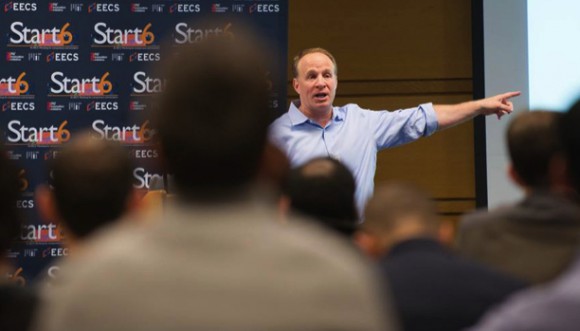MIT has a novel idea. With its Start6 program, which concluded last week, the world-famous engineering school believes that it can teach its computer scientists entrepreneurship in just two weeks.
Led by engineering and computer science professor Anantha Chandrakasan, the Start6 course is in its second year, and MIT undergrads and students from the school’s various graduate programs enrolled during the school’s Independent Activities Period. Over the two weeks, the students went through a boot camp of sorts: sitting in on lessons about startup marketing, how equity is usually shared among founders, how equity sharing breaks down between venture capitalists and employees, and many other vital business lessons.
Most of the students either had their own startup idea or a fledgling company; one student shared his plans to speed up computer processing using software, another has created ways to animate math calculations, and yet another is working on plans to improve the mortality rate of heart attack victims in China. One student-run startup, Belleds Technology, has already raised over $100,000 for their smart home lighting and audio platform through a successful Kickstarter campaign.
Chandrakasan, the Joseph F. and Nancy P. Keithley Professor of Electrical Engineering at MIT, said that the course aims to show the students what it means to be an entrepreneur. “The course exposed the students not just to one way of thinking but a multitude of different ways to think about starting a business,” he said.
But underlying the entire project was the legit question of whether being a successful company founder can even be taught. Bill Aulet, the managing director of Martin Trust Center for MIT Entrepreneurship, asked the question during his lecture, as did Joel Schindall, a professor in MIT’s Department of Electrical Engineering and Computer Science and the co-director of the Gordon-MIT Engineering Leadership Program.
And yet, both Aulet and Schindall (and the other guest lecturers who gave talks throughout the two weeks) did their damnedest to do just that, sharing their experiences on building great businesses with the budding entrepreneurs. The sentiment of many of the startup founders, professors, venture capitalists, and others who led discussions or guided teamwork sessions was that everyone in the room has the inborn ability to build a great company, but that there is a heck of a lot to learn and to build in order to make that happen.
One of the most popular sessions among students was taught by North Bridge Venture Partners’ Jamie Goldstein, who explained the basics of startup financing and unmasked some of the dirty details of how equity and venture capital investments work. The students were awed at the opportunity to hear the ins and outs of how to exchange equity for funding directly from an active local venture capitalist, and it showed in the extensive question and answer session. Goldstein finally had to end the questions after fielding over a dozen queries.
Throughout the week, the students were exposed to some of the city’s most experienced executives. DataGravity‘s Paula Long wowed the class during her talk on leadership. Actifio chief marketing officer Mike Troiano gave some concrete tips on how to best brand a company, and then worked with the small teams on how to best to market their ideas. Well-known data research guru Michael Stonebraker made sure that the students understood that if they take investment money, “The VCs are in charge, and you just got to deal with it…They are in control and you are not.”
Other panelists and speakers included Bernie Gordon, who spoke about inventing high-speed analog-to-digital conversion; MIT undergrad Kris Bronner, who founded UNREAL Candy; and Andreessen Horowitz general partner Peter Levine, who discussed business ethics. The students also had the opportunity to get out into the Boston startup community with “field trips” to MassChallenge, Techstars, and Paul English’s Blade incubator.
Michael Chen, an MIT undergrad and the co-founder of Belleds, said that he took Start6 to figure out how to connect better with venture capitalists and learn more about fundraising. Chen said that the best aspect of the course was that startups at different stages of growth could all get something out of the program. “It was great to have the opportunity to reach and talk to [Kayak co-founder] Paul English in person because he has already done interesting things with consumer products.”
On the last day of the program, after the students had finished giving their startup pitches and demos, I had the chance to catch up with MIT alum Marek Olszewski, a co-founder of Locu (which was acquired by GoDaddy last year), and ask him the question that had pervaded a lot of the discussion over the course about whether or not entrepreneurship can be taught.
At first, a bit hesitantly, Olszewski said teaching people to be an entrepreneur in two weeks is a tough task, but acknowledged, “If anything comes close to being able to do that best, it’s this program.”
From: BetaBoston








Leave a Reply
You must be logged in to post a comment.